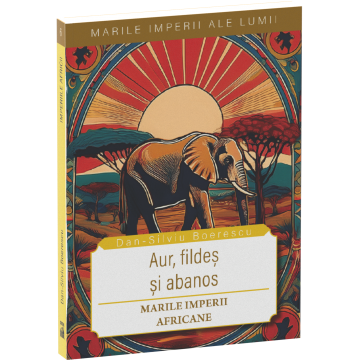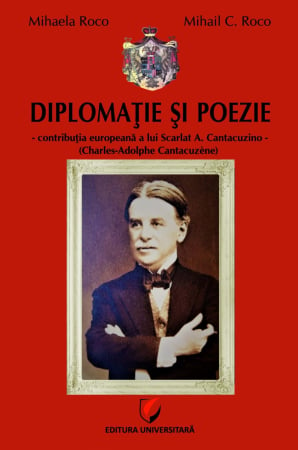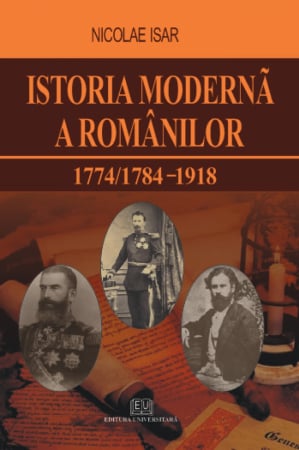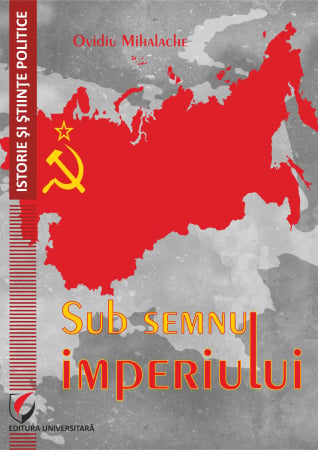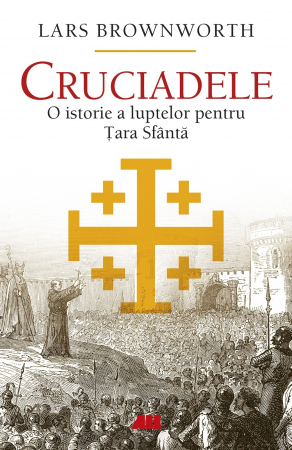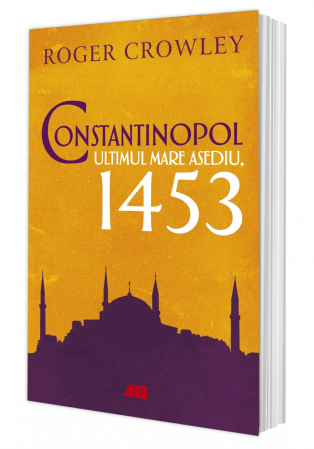Manuscript proposals: [email protected] / 0745 204 115 //// Tracking orders Individuals / Sales: 0745 200 357 / Orders Legal entities: 0721 722 783
6359.png) Corneliu Coposu and the Romanian Exile under the Magnifying Glass of the Securitate (Documents and Correspondence)
Corneliu Coposu and the Romanian Exile under the Magnifying Glass of the Securitate (Documents and Correspondence)
6359.png)
ISBN: 978-606-28-0657-6
DOI: 10.5682/9786062806576
Publisher year: 2017
Edition: I
Pages: 310
Publisher: Editura Universitară
Author: Marin Pop
Product Code:
9786062806576
Do you need help?
0745 200 357
- Description
- Download (1)
- Authors
- Content
- More details
- Reviews (0)
Corneliu Coposu is also indisputably part of the gallery of great personalities that Tara Silvaniei gave to the country. In chronological order, he is the fourth great personality of Salaj, according to the ideologue of the Pasoptist revolution in Transylvania, Simion Barnutiu, the great patron, memorandum, president of the Romanian National Party and founder of the Great Union, Gheorghe Pop de Basesti and his mentor, Iuliu Maniu, one among the main founders of the Great Union from December 1, 1918, president of the Governing Council of Transylvania, the provisional executive body, prime minister of Romania in three governments and leader of the democratic opposition in Romania during authoritarian or totalitarian regimes, imposed by force in our country . Corneliu Coposu was born on May 20, 1914 in Bobota, Salaj County. His father, Valentin Coposu, a signatory of the Great Union from December 1, 1918, was a Greek Catholic priest in this locality, and his mother's name was Aurelia and she was the daughter of the Greek Catholic archpriest, Iulian Anceanu. Therefore, his appearance on the Romanian political scene was not accidental, because Corneliu Coposu came from a family with old historical traditions. He had as priests on the maternal line seven priests, and on the paternal line three. Professionally trained at the schools of Blaj and Cluj, Corneliu Coposu was arrested in 1947, at the age of 33, in full professional and political ascent, being elected Deputy Secretary General of the National Peasant Party. He endured the ordeal of communist prisons for no less than 17 years, if we consider the years of compulsory residence, respectively 1962-1964. After his release, he was permanently under the magnifying glass of the Securitate, pursued, arrested, investigated and marginalized, until 1990.
A research topic less approached by Romanian historiography, is that of the Romanian exile from the communist period. The official communist propaganda infuriated those who left the country, because, once in the free world, in the West, they expressed their democratic convictions, telling the truth about what is happening beyond the Iron Curtain, in communist Romania, where the totalitarian state does not respect the most basic rights of citizens. Unfortunately, the communist propaganda managed to create a negative image of those who were forced to leave the country in those years, an image that was deeply permeated in the consciousness of the Romanians left in the country. The most relevant example, in our opinion, is that of the election campaign in 1990, when slogans appeared with the message that those who left did not eat soy salami, just like those who remained in the country, and lived in huzur. Of course, these slogans were launched by those interested in not losing an uninformed electorate, after being held for 45 years in darkness, cold and hunger. The reality is, however, completely different, which is why we also set out to start researching this vast topic, having as a case study the connections of the great politician from Salaj, Corneliu Coposu, with the Romanian exile.
In his turn, Corneliu Coposu was accused of living in a "huzur" on the terraces of Paris and of not staying in the country to eat the famous soy salami. As the great politician pointed out, he has not left the country since 1938. In fact, as can be seen from the documents he publishes, he was not allowed to cross the country's border into Bulgaria in the interest of service. Also, in the "menu" of the communist prisons, we do not believe that not even that soy salami was mentioned, but only barley.
Product compliance information
A research topic less approached by Romanian historiography, is that of the Romanian exile from the communist period. The official communist propaganda infuriated those who left the country, because, once in the free world, in the West, they expressed their democratic convictions, telling the truth about what is happening beyond the Iron Curtain, in communist Romania, where the totalitarian state does not respect the most basic rights of citizens. Unfortunately, the communist propaganda managed to create a negative image of those who were forced to leave the country in those years, an image that was deeply permeated in the consciousness of the Romanians left in the country. The most relevant example, in our opinion, is that of the election campaign in 1990, when slogans appeared with the message that those who left did not eat soy salami, just like those who remained in the country, and lived in huzur. Of course, these slogans were launched by those interested in not losing an uninformed electorate, after being held for 45 years in darkness, cold and hunger. The reality is, however, completely different, which is why we also set out to start researching this vast topic, having as a case study the connections of the great politician from Salaj, Corneliu Coposu, with the Romanian exile.
In his turn, Corneliu Coposu was accused of living in a "huzur" on the terraces of Paris and of not staying in the country to eat the famous soy salami. As the great politician pointed out, he has not left the country since 1938. In fact, as can be seen from the documents he publishes, he was not allowed to cross the country's border into Bulgaria in the interest of service. Also, in the "menu" of the communist prisons, we do not believe that not even that soy salami was mentioned, but only barley.
-
Corneliu Coposu and the Romanian exile under the magnifying glass of the Securitate
Download
MARIN POP
Foreword / 7
Introductory study / 11
I. Documents / 30
I.1. List of documents / 31
I.2. Documents / 35
II. Correspondence / 199
II.1. List of letters / 204
II.2. Correspondence / 206
Corneliu Coposu is also indisputably part of the gallery of great personalities that Tara Silvaniei gave to the country. In chronological order, he is the fourth great personality of Salaj, according to the ideologue of the Pasoptist revolution in Transylvania, Simion Barnutiu, the great patron, memorandum, president of the Romanian National Party and founder of the Great Union, Gheorghe Pop de Basesti and his mentor, Iuliu Maniu, one among the main founders of the Great Union from December 1, 1918, president of the Governing Council of Transylvania, the provisional executive body, prime minister of Romania in three governments and leader of the democratic opposition in Romania during authoritarian or totalitarian regimes, imposed by force in our country.
Corneliu Coposu was born on May 20, 1914 in Bobota, Salaj County. His father, Valentin Coposu, a signatory of the Great Union from December 1, 1918, was a Greek Catholic priest in this locality, and his mother's name was Aurelia and she was the daughter of the Greek Catholic archpriest, Iulian Anceanu. Therefore, his appearance on the Romanian political scene was not accidental, because Corneliu Coposu came from a family with old historical traditions. He had as priests on the maternal line seven priests, and on the paternal line three.
Professionally trained at the Blaj and Cluj schools, Corneliu Coposu was arrested in 1947, at the age of 33, in full professional and political ascent, being elected deputy general secretary of the National Peasant Party. He endured the ordeal of communist prisons for no less than 17 years, if we consider the years of compulsory residence, respectively 1962-1964. After his release, he was permanently under the magnifying glass of the Securitate, pursued, arrested, investigated and marginalized, until 1990.
A research topic less approached by Romanian historiography, we believe, is that of the Romanian exile from the communist period. The official communist propaganda infuriated those who left the country, because, once in the free world, in the West, they expressed their democratic convictions, telling the truth about what is happening beyond the Iron Curtain, in communist Romania, where the totalitarian state does not respect the most basic rights of citizens. Unfortunately, the communist propaganda managed to create a negative image of those who were forced to leave the country in those years, an image that was deeply permeated in the consciousness of the Romanians left in the country. The most relevant example, in our opinion, is that of the election campaign in 1990, when slogans appeared with the message that those who left did not eat soy salami, just like those who remained in the country, and lived in huzur. Of course, these slogans were launched by those interested in not losing an uninformed electorate, after being held for 45 years in darkness, cold and hunger. The reality is, however, completely different, which is why we also set out to start researching this vast topic, having as a case study the connections of the great politician from Salaj, Corneliu Coposu, with the Romanian exile.
In his turn, Corneliu Coposu was accused of living in a "huzur" on the terraces of Paris and of not staying in the country to eat the famous soy salami. As the great politician pointed out, he has not left the country since 1938. In fact, as can be seen from the documents he publishes, he was not allowed to cross the country's border into Bulgaria in the interest of service. Also, in the "menu" of the communist prisons, we do not believe that not even that soy salami was mentioned, but only barley.
Although he did not leave the country during the communist regime, Corneliu Coposu managed to keep in touch with the Romanians who went into exile, especially with his former party colleagues, as can be seen from the documents we publish in this volume. Therefore, this paper aims to introduce in the scientific circuit, unique information regarding the connections of Corneliu Coposu with the Romanian exile, which are permanently under the strict supervision of the Romanian State Security.
Structured on two major chapters, our scientific approach is based on the information studied in the archives of the National Council for the Study of Security Archives, respectively the Informative Tracking File (38 volumes) and some files from the Documentary Fund, which refer to Corneliu Coposu's connections with Romanian exile .
The first chapter contains 97 original documents, discovered by us in the CNSAS archives, selected from the tens of thousands of pages that refer to Corneliu Coposu. The documents, chronologically framed between 1968-1989, are notes, report-notes, stage notes, analysis notes and informative notes regarding the activity of Corneliu Coposu and his connections with the Romanian exile. Also, there are reports of the county inspectorates of the State Security, of the Security of the Municipality of Bucharest or of the First Directorate of Security. Most of the documents were submitted to the First Directorate of State Security, then to the Security Inspectorate of Cluj County, to the Special Unit "S" and to the Independent Service "D".
Among the most important documents, we mention those that refer to the attempt to exile Corneliu Coposu from the country in 1969 in order to revitalize the activity of the Romanian exile, on the mode of action in the case of "HIMERELE", Extract Note on some aspects of Romanian emigration, the address of the First Directorate of State Security to the Directorate for Passports, Evidence of Foreigners and Border Crossing Control, by which Corneliu Coposu is forbidden to leave the country, invoking -it's an incredible reason, namely that he was involved in a theft of paintings from the Brukental Museum. We also believe that the document of November 30, 1988 of the First Directorate of State Security, "synthesis of the opinion of the named Coposu Cornel, former Deputy Secretary General of PNT, on the situation of Romanian emigration" and the Memorandum Book, Ed. Acarda, London, 1979, received clandestinely by Corneliu Coposu from the West, through a renowned academician, friend of Corneliu Coposu, in which we find unique information regarding the activity of the Romanian exile.
In the second chapter, we publish a vast correspondence maintained by Corneliu Coposu with brand representatives of the Romanian exile. These are 75 letters that are kept in the CNSAS archive, especially in the Documentary collection. They were copied by the Securitate and reintroduced in the postal circuit, according to the "customs" of the time. Chronologically, the correspondence is between 1964-1989.
Corneliu Coposu corresponded with prominent personalities of the Romanian exile such as Emil Ghilezan (Italy), Ion Ratiu (England), Georges Serdici (Geneva or London), Lotte Thus (Oslo, Norway) whom he knew from 1945-1946 as an attaché. of the Anglo-Americans in Bucharest and who sent him various magazines and books, Liviu J. Gatterburg, called the Count, settled in Switzerland, Augustin Hila, settled in Brazil, Costel Mares (Germany), George Beza and his wife (Paris, France ), Dean Milhovan (USA), Vasile Macarescu (Cologne, Germany). Also, correspondence is kept with his relatives, of which we publish the one with the grandchildren Fulger Daniela and Cristian, the sons of his sister-in-law, Antoinette, Arlette's sister, settled in Offenbach in the Federal Republic of Germany and with the family of his son, Pop Ilie, emigrant in the USA.
The theme of the letters is diverse, from family to political issues, to the activity of various Romanian groups in exile. This does not escape the vigilant eyes of the Securitate, which "invited" him to numerous investigations, following various letters sent or received. Precisely because of this, he often tried to send verbal messages, which his "intermediaries" traveling to the West, learned by heart and so much of this information did not reach the "ears of the Securitate" or reached much later through through whistleblowers.
Both the contents of the documents and the correspondence clearly show that the national-peasant representatives in the West saw in Corneliu Coposu the natural successor of his mentor, Iuliu Maniu, at the head of the National Peasant Party and expected a favorable external and internal context for his reinstatement. legally, which happened on January 8, 1990, PNT being the first political party re-established after 1989. We emphasize that in this volume, for a better understanding of the time, we have kept the original form of the documents and correspondence that we have. discovered it in the CNSAS archive, including the mistakes of those who wrote them, apart from updating the spelling ("i" from "a", "are" and not "are", etc.)
In conclusion, we believe that this volume can be a useful tool for those who want to deepen the recent history, still unsettled and assumed, in terms of Corneliu Coposu's connections with the Romanian exile.
Corneliu Coposu was born on May 20, 1914 in Bobota, Salaj County. His father, Valentin Coposu, a signatory of the Great Union from December 1, 1918, was a Greek Catholic priest in this locality, and his mother's name was Aurelia and she was the daughter of the Greek Catholic archpriest, Iulian Anceanu. Therefore, his appearance on the Romanian political scene was not accidental, because Corneliu Coposu came from a family with old historical traditions. He had as priests on the maternal line seven priests, and on the paternal line three.
Professionally trained at the Blaj and Cluj schools, Corneliu Coposu was arrested in 1947, at the age of 33, in full professional and political ascent, being elected deputy general secretary of the National Peasant Party. He endured the ordeal of communist prisons for no less than 17 years, if we consider the years of compulsory residence, respectively 1962-1964. After his release, he was permanently under the magnifying glass of the Securitate, pursued, arrested, investigated and marginalized, until 1990.
A research topic less approached by Romanian historiography, we believe, is that of the Romanian exile from the communist period. The official communist propaganda infuriated those who left the country, because, once in the free world, in the West, they expressed their democratic convictions, telling the truth about what is happening beyond the Iron Curtain, in communist Romania, where the totalitarian state does not respect the most basic rights of citizens. Unfortunately, the communist propaganda managed to create a negative image of those who were forced to leave the country in those years, an image that was deeply permeated in the consciousness of the Romanians left in the country. The most relevant example, in our opinion, is that of the election campaign in 1990, when slogans appeared with the message that those who left did not eat soy salami, just like those who remained in the country, and lived in huzur. Of course, these slogans were launched by those interested in not losing an uninformed electorate, after being held for 45 years in darkness, cold and hunger. The reality is, however, completely different, which is why we also set out to start researching this vast topic, having as a case study the connections of the great politician from Salaj, Corneliu Coposu, with the Romanian exile.
In his turn, Corneliu Coposu was accused of living in a "huzur" on the terraces of Paris and of not staying in the country to eat the famous soy salami. As the great politician pointed out, he has not left the country since 1938. In fact, as can be seen from the documents he publishes, he was not allowed to cross the country's border into Bulgaria in the interest of service. Also, in the "menu" of the communist prisons, we do not believe that not even that soy salami was mentioned, but only barley.
Although he did not leave the country during the communist regime, Corneliu Coposu managed to keep in touch with the Romanians who went into exile, especially with his former party colleagues, as can be seen from the documents we publish in this volume. Therefore, this paper aims to introduce in the scientific circuit, unique information regarding the connections of Corneliu Coposu with the Romanian exile, which are permanently under the strict supervision of the Romanian State Security.
Structured on two major chapters, our scientific approach is based on the information studied in the archives of the National Council for the Study of Security Archives, respectively the Informative Tracking File (38 volumes) and some files from the Documentary Fund, which refer to Corneliu Coposu's connections with Romanian exile .
The first chapter contains 97 original documents, discovered by us in the CNSAS archives, selected from the tens of thousands of pages that refer to Corneliu Coposu. The documents, chronologically framed between 1968-1989, are notes, report-notes, stage notes, analysis notes and informative notes regarding the activity of Corneliu Coposu and his connections with the Romanian exile. Also, there are reports of the county inspectorates of the State Security, of the Security of the Municipality of Bucharest or of the First Directorate of Security. Most of the documents were submitted to the First Directorate of State Security, then to the Security Inspectorate of Cluj County, to the Special Unit "S" and to the Independent Service "D".
Among the most important documents, we mention those that refer to the attempt to exile Corneliu Coposu from the country in 1969 in order to revitalize the activity of the Romanian exile, on the mode of action in the case of "HIMERELE", Extract Note on some aspects of Romanian emigration, the address of the First Directorate of State Security to the Directorate for Passports, Evidence of Foreigners and Border Crossing Control, by which Corneliu Coposu is forbidden to leave the country, invoking -it's an incredible reason, namely that he was involved in a theft of paintings from the Brukental Museum. We also believe that the document of November 30, 1988 of the First Directorate of State Security, "synthesis of the opinion of the named Coposu Cornel, former Deputy Secretary General of PNT, on the situation of Romanian emigration" and the Memorandum Book, Ed. Acarda, London, 1979, received clandestinely by Corneliu Coposu from the West, through a renowned academician, friend of Corneliu Coposu, in which we find unique information regarding the activity of the Romanian exile.
In the second chapter, we publish a vast correspondence maintained by Corneliu Coposu with brand representatives of the Romanian exile. These are 75 letters that are kept in the CNSAS archive, especially in the Documentary collection. They were copied by the Securitate and reintroduced in the postal circuit, according to the "customs" of the time. Chronologically, the correspondence is between 1964-1989.
Corneliu Coposu corresponded with prominent personalities of the Romanian exile such as Emil Ghilezan (Italy), Ion Ratiu (England), Georges Serdici (Geneva or London), Lotte Thus (Oslo, Norway) whom he knew from 1945-1946 as an attaché. of the Anglo-Americans in Bucharest and who sent him various magazines and books, Liviu J. Gatterburg, called the Count, settled in Switzerland, Augustin Hila, settled in Brazil, Costel Mares (Germany), George Beza and his wife (Paris, France ), Dean Milhovan (USA), Vasile Macarescu (Cologne, Germany). Also, correspondence is kept with his relatives, of which we publish the one with the grandchildren Fulger Daniela and Cristian, the sons of his sister-in-law, Antoinette, Arlette's sister, settled in Offenbach in the Federal Republic of Germany and with the family of his son, Pop Ilie, emigrant in the USA.
The theme of the letters is diverse, from family to political issues, to the activity of various Romanian groups in exile. This does not escape the vigilant eyes of the Securitate, which "invited" him to numerous investigations, following various letters sent or received. Precisely because of this, he often tried to send verbal messages, which his "intermediaries" traveling to the West, learned by heart and so much of this information did not reach the "ears of the Securitate" or reached much later through through whistleblowers.
Both the contents of the documents and the correspondence clearly show that the national-peasant representatives in the West saw in Corneliu Coposu the natural successor of his mentor, Iuliu Maniu, at the head of the National Peasant Party and expected a favorable external and internal context for his reinstatement. legally, which happened on January 8, 1990, PNT being the first political party re-established after 1989. We emphasize that in this volume, for a better understanding of the time, we have kept the original form of the documents and correspondence that we have. discovered it in the CNSAS archive, including the mistakes of those who wrote them, apart from updating the spelling ("i" from "a", "are" and not "are", etc.)
In conclusion, we believe that this volume can be a useful tool for those who want to deepen the recent history, still unsettled and assumed, in terms of Corneliu Coposu's connections with the Romanian exile.
If you want to express your opinion about this product you can add a review.
write a review

![Corneliu Coposu and the Romanian Exile under the Magnifying Glass of the Securitate (Documents and Correspondence) [1] Corneliu Coposu and the Romanian Exile under the Magnifying Glass of the Securitate (Documents and Correspondence) [1]](https://gomagcdn.ro/domains/editurauniversitara.ro/files/product/large/corneliu-coposu-si-exilul-romanesc-sub-lupa-securitatii-documente-si-corespondenta-371-332001.jpg)


